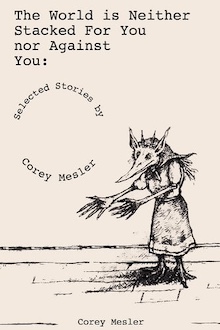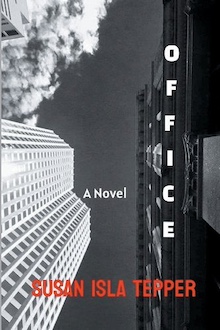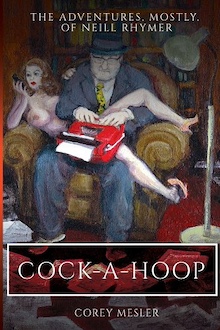It seems every time you turn around someone wants to be a writer and that is certainly understandable. Especially in these times of great uncertainty. While you are writing you have control and most people are worried that their control over their lives is going to be eradicated in one way or the other. We (Susan Tepper and Corey Mesler) have been discussing writing for years. Every Monday, Corey sends out a ‘Monday Poem’ written by a seriously fabulous poet. Susan always responds and as a result of these mailings she has broadened her poet base. When people hear you are a published writer, most get very excited. They want to know how you started, where you draw from, and all sorts of other things they might do to become a writer. We focused our conversation here on fiction since both of us just released fiction books.
+
Susan Tepper: In your new story collection you name a character Rodney Carp. Was that a fluke (no pun intended) or did you have a reason for this unusual name choice? This fish and the rod… interesting. I happen to own a beautiful white ceramic bowl with a blue carp painted on it that I brought home from China in the 90’s. I paid about two dollars (U.S.) on the street in Shanghai. Now when I put fruit in that bowl your Carp character jumps into my brain.

Corey Mesler: The naming of characters is one of my favorite parts in building a story. Sometimes it’s just writerly instinct; I’ll think this character who works in a bank should be called Henry. And that first naming doesn’t always stick. More often, I get playful, which is why many of my books are populated with folks with odd monikers. Some readers find this pretentious; others appreciate the impishness. I like a good pun; for instance I called a stripper character, Callie Pigeon. And I like to play with anagrams. And, here, I will tell you a secret that probably matters to no one. My favorite character of all my creations, and one who can be found in numerous books, is Camel Jeremy Eros, Memphis poet and bon vivant. I think of him as the man I wish I was. He’s my dream eidolon, or myself in another turn of the cosmic swinging doors. And his name…wait for this…is an anagram of Corey James Mesler.
What about you? How important are the names of your characters in how you view them, even how you use them? Do you ever name a character after an old lover, or name a corrupt character after someone who did you wrong?

ST: It’s always a crap-shoot for me, the naming. I take the first name that pops in my head. But here’s what’s kind of weird. In my prior novel Office I used the name Janice. Then I had her husband, who was falling apart mentally, refer to her in several chapters as Justine. It was deliberate and some people wrote to me and said they thought I made an error, whereas it was a foreshadowing of his madness to come. So anyway, I had those two J’s. Then along comes the new book and out pops Janelle (a 3rd J) for my protagonist! Go figure—I don’t know what I’ll get on the next book! I once had a character named Tim, and at the last minute I changed it to Tad. The Tim/Tad character was kind of an idiot, named after a Tim I severely disliked. Then we sort of made a quiet peace, and I didn’t want to insult him so I changed it to Tad. Except—in one chapter I missed making the change! I still laugh as I’m telling this to you.
Corey, do you ever write scenes for characters that are actually scenes from your own life?
CM: I love that you had your character make a gaffe that readers thought was the author’s. Being misunderstood is always on my mind. It’s a little disappointing to think that some of the jokes and ironies I spend so much time over go unappreciated. I imagine that is every writer’s lament.

I used to use my actual life more in my books, especially in my first novel, because I didn’t know how else to write a novel. I was not waggish or brave enough yet. I had zero confidence that I could gather enough words to fashion a novel-length story (I had to look up the word count for what constitutes a novel). I was sure I didn’t know all the rules. Since then, I have written a semi-autobiographical sex romp (Cock-a-Hoop) which is better left uncommented upon. And, more recently, I have written a novel based on my own struggles with agoraphobia and panic syndrome. So far, it is unpublished.
Speaking of first novels, how do you feel about yours? How did you write it and how did it get published? I feel like I backed into the novel by writing mine totally in dialogue. I was, frankly, shocked it got accepted for publication. Now, almost 30 years later, I find myself a little proud of it.
ST: Novels are the most fun of all the genres I work in. My first novel was never published though it spent two years at HarperCollins and was pushed around to four different imprints there. But that was such a different time in publishing. You had the agent and you had the editors at the publishing house. Frankly I prefer the Indie route. I do all my own editing, for better or worse! But my first published Indie novel was a gas for me to write. I had a lower back problem, at that time, so I wrote it with pillows propped behind my back while sitting at the kitchen table working off my teensy laptop. It was called The Merrill Diaries and involved a young woman, Merrill, who travels all over the place and finally ends up in London. Since I lived in the UK years ago, and travelled back there frequently, it was fun to imagine my character in various old haunts I used to go to. I wrote it as a novel-in-chapters, where each was titled, and each could be a complete short story, but it progressed along the route of a novel. I sent the publisher the work chapter by chapter. Pure Slush out of Australia published it. I did a lot of writing for his themed anthologies which is how I found him.
I would love a little hint of your life turned into a piece of fiction.
CM: Do you ever think of going back to the first novel, giving it a polish, and submitting again? I also have an abandoned first book. Part of it was published in raccoon magazine and I wrote about 10,000 more words and then gave it up. Again, because I had no confidence. I’ll have to get a copy of Merrill. I love that format.
I’ll spill, but only a drop or two. In Cock-a-Hoop, I was driven (by perversity and hubris) to take my romantic history and turn it into a comic romp, a fantasy powered by lust and humor. Some of the female characters my protagonist hooked up with were totally fictional. Most, though, were based on real women and some only thinly disguised. I hope I didn’t offend anyone (except a few reviewers) and I promise I did it out of love. The newer, still unpublished novel, which is based on my struggles with poor health, was painful to write. It started as memoir but it was making me physically ill, literally. So, I decided to leaven the weight with whimsy and turn it into a novel.
Here are the two things reviewers and readers pick on about my writing (I acknowledge them here because I am still occasionally frustrated with these reproaches and because I have nothing to hide): too much sex, and too much fancy language. What, if anything, has a reviewer (or reviewers or readers) criticized in your work? Does it make you angry? Do you ever agree with the critics?

ST: I do think about going back to the first novel, but somehow new writing pops up and pushes that project away. That first novel won me a prize in the Francis Ford Coppola Zoetrope Contest in 2003. I was ecstatic. But book writing is very different in style now. You don’t get 50 or so pages to do your ‘set-up’. More like a page or two at most, or you lose the reader’s interest now. As for ‘real life’ invading my book The Merrill Diaries—it did and with abandon. I gave over many incidents to Merrill. This one for instance: My husband and I hopped on a red double-decker in London to get to Marble Arch. We went up top where the bus was empty but for a small group of Japanese tourists. After a bit a man came up and sat down across the aisle a few rows up. He was in plain clothing, rather than the standard uniform, so I was surprised when he started to do his ‘tour guide’ thing. Except it wasn’t a tour but more his ‘observations’ on life, and what did we think about his baby blue eyes. All kind of wonky. So we just looked straight ahead ignoring him. That must have really bugged the guy because after a short while he said: “Hey, you in the shades, what do you think?” Well since I was wearing sunglasses and he was looking straight at me, it was obvious he was talking to me. I said: “Are you speaking to me?”
“Yeah,” he said.
Then I said, “I think you’re a real asshole.”
Well! He jumped out of his seat and ordered us off the bus!
We said NO WAY! Not till we get to Marble Arch.
He ran down the curving steel stairs and brought the bus driver up. We still refused to get off.
This happened at every stop along the way!
Then they called the Police on us. The police came on and when we explained, they told us we could stay on the bus till our stop. Back at our hotel I phoned the tour company and told them what went on. They were very upset upon hearing my story.
But in retrospect it was actually hilarious! Then, about two years later, with a zillion red double-decker buses parked along Piccadilly, who did we spot but Allen! (that was his name). He was in a blue uniform and helping old ladies up the bus stairs. Doing his job!
I tweaked the incident and used it in my novel The Merrill Diaries.
As for reviews or reviewers, I never listen to criticism. Critics have ruined some very fine writing and theatre works.
CM: Zoetrope is high cotton. You might want to look at that old manuscript again. I think you’re right about the lack of patience readers now have for lengthy build-ups. Anyone read Henry James anymore?
That’s a hilarious incident. If I had adventures like that I’d work them into my novels. You’ve seen more of the world than I have. Most of my adventures have taken place inside my leaky coconut.
I admire you for not listening to your critics. I’m too thin-skinned to be a creative, perhaps. I should do something with fewer reviewers, like firefighting, or phrenology.
Your books are so grounded, so savvy about the world, and peopled with real breathing humans. I admire your responsiveness and your attention to the actual. Mine seem to be made of fairy-cake. Perhaps we’ve had different literary heroes. Gimme your five most influential writers, not favorites necessarily but writers you’ve read a lot of and who have left their stamp on your work. I’ll give you mine:
Franz Kafka, Iris Murdoch, James Tate, Kurt Vonnegut, Steve Stern.
ST: Corey, my take on your books is very different from how you view them. I find yours to be always quirky and highly imaginative with characters that stick.
The writers I love the best and keep coming back to (in no special order) are Maugham, Edna O’Brien, James Baldwin, Graham Greene, and William Trevor.
Of course there are many more but I think I’ve read down just about everything these five geniuses have written.
To Life & Literature!
+++
Susan Isla Tepper is a twenty year writer in all genres, and the author of 12 published books of fiction and poetry and five Stage Plays. Her most recent novel titled ‘hair of a fallen angel’ came out in early October from Spuyten Duyvil Publishing. In the fall of 2022, her play concerning artist Jackson Pollock titled The Crooked Heart premiered in a staged-reading at the Irish Repertory Theatre, NYC. Adapted for the stage from an earlier novel it received a Pulitzer Prize Nomination. Tepper is a native New Yorker. Please visit: www.susantepper.com
+
Corey Mesler has been published in numerous anthologies and journals including Poetry, Gargoyle, Five Points, Lunch Ticket, Good Poems American Places, and New Stories from the South. He has published over 45 books of fiction and poetry. His newest book, The World is Neither Stacked for Nor Against You: Selected Short Stories, is from Livingston Press. He also wrote the screenplay for We Go On, which won The Memphis Film Prize in 2017. With his wife he runs Burke’s Book Store (est. 1875) in Memphis.